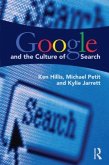What did you do before Google? The rise of Google as the dominant Internet search provider reflects a generationally-inflected notion that everything that matters is now on the Web, and should, in the moral sense of the verb, be accessible through search. In this theoretically nuanced study of search technology's broader implications for knowledge production and social relations, the authors shed light on a culture of search in which our increasing reliance on search engines influences not only the way we navigate, classify, and evaluate Web content, but also how we think about ourselves and the world around us, online and off. Ken Hillis, Michael Petit, and Kylie Jarrett seek to understand the ascendancy of search and its naturalization by historicizing and contextualizing Google's dominance of the search industry, and suggest that the contemporary culture of search is inextricably bound up with a metaphysical longing to manage, order, and categorize all knowledge. Calling upon this nexus between political economy and metaphysics, Google and the Culture of Search explores what is at stake for an increasingly networked culture in which search technology is a site of knowledge and power.
Hinweis: Dieser Artikel kann nur an eine deutsche Lieferadresse ausgeliefert werden.
Hinweis: Dieser Artikel kann nur an eine deutsche Lieferadresse ausgeliefert werden.
"Some say Google makes us stupid. Others say it should make us worry. Google and the Culture of Search makes us both smarter and more worried about Google's monopoly powers. As Hillis et al. show, Google's lineage runs less to General Motors than to a long line of mathematicians and metaphysicians who wanted to organize the world's information-never before has the strange beast of Google been so clearly put into its proper family tree. Read this book!" -John Durham Peters, University of Iowa
"If you wonder why Google gets billions of search queries every day, and (like me) don't think 'because it's free' or 'because it's there' are sufficient answers, you should read this book. It's a treasure trove of insights into the culture of search." -Viktor Mayer-Schönberger, Oxford Internet Institute
"If you wonder why Google gets billions of search queries every day, and (like me) don't think 'because it's free' or 'because it's there' are sufficient answers, you should read this book. It's a treasure trove of insights into the culture of search." -Viktor Mayer-Schönberger, Oxford Internet Institute








